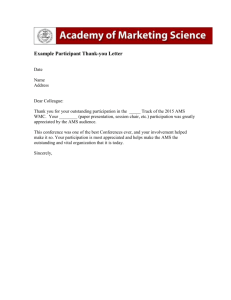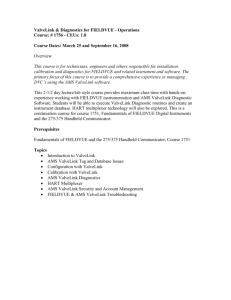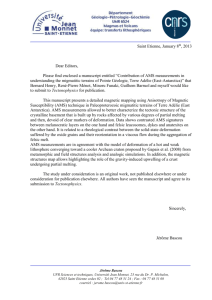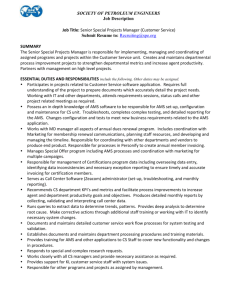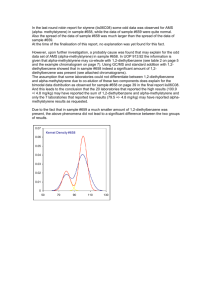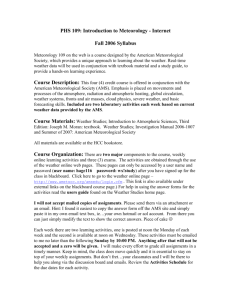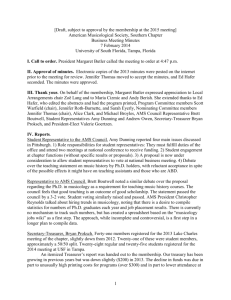Minutes
advertisement
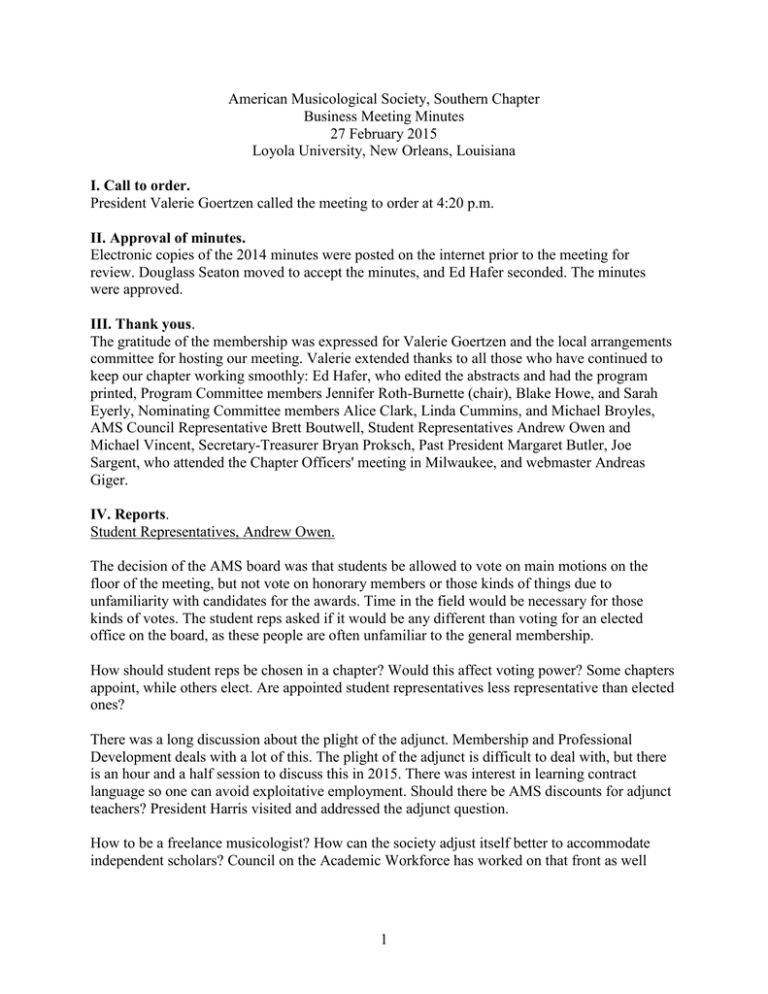
American Musicological Society, Southern Chapter Business Meeting Minutes 27 February 2015 Loyola University, New Orleans, Louisiana I. Call to order. President Valerie Goertzen called the meeting to order at 4:20 p.m. II. Approval of minutes. Electronic copies of the 2014 minutes were posted on the internet prior to the meeting for review. Douglass Seaton moved to accept the minutes, and Ed Hafer seconded. The minutes were approved. III. Thank yous. The gratitude of the membership was expressed for Valerie Goertzen and the local arrangements committee for hosting our meeting. Valerie extended thanks to all those who have continued to keep our chapter working smoothly: Ed Hafer, who edited the abstracts and had the program printed, Program Committee members Jennifer Roth-Burnette (chair), Blake Howe, and Sarah Eyerly, Nominating Committee members Alice Clark, Linda Cummins, and Michael Broyles, AMS Council Representative Brett Boutwell, Student Representatives Andrew Owen and Michael Vincent, Secretary-Treasurer Bryan Proksch, Past President Margaret Butler, Joe Sargent, who attended the Chapter Officers' meeting in Milwaukee, and webmaster Andreas Giger. IV. Reports. Student Representatives, Andrew Owen. The decision of the AMS board was that students be allowed to vote on main motions on the floor of the meeting, but not vote on honorary members or those kinds of things due to unfamiliarity with candidates for the awards. Time in the field would be necessary for those kinds of votes. The student reps asked if it would be any different than voting for an elected office on the board, as these people are often unfamiliar to the general membership. How should student reps be chosen in a chapter? Would this affect voting power? Some chapters appoint, while others elect. Are appointed student representatives less representative than elected ones? There was a long discussion about the plight of the adjunct. Membership and Professional Development deals with a lot of this. The plight of the adjunct is difficult to deal with, but there is an hour and a half session to discuss this in 2015. There was interest in learning contract language so one can avoid exploitative employment. Should there be AMS discounts for adjunct teachers? President Harris visited and addressed the adjunct question. How to be a freelance musicologist? How can the society adjust itself better to accommodate independent scholars? Council on the Academic Workforce has worked on that front as well 1 Representative to AMS Council, Brett Boutwell. 1. News from the AMS Board, as relayed by Past Pres. Reynolds: The AMS Board rejected AMS Council's suggested statement on teacher qualifications, debated in 2012 and 2013, but may choose to incorporate it into a "best practices" statement. AMS Board announced major gifts to AMS: William Holmes/Frank D’Accone Endowment (for travel and research in the history of opera) and a large unencumbered bequest from Elizabeth Ann Keitel, wife of the late Claude Palisca. Past President Reynolds explained that the Board decided to invest the funds conservatively. The interest will be used to assist student and low-income members. AMS Board reflected on matters raised by the Program Committee in relation to the Annual Meeting. President Reynolds noted that since 2002, certain rules have been imposed on the program committee. One of the most contentious of these is whether reading of proposals should be completely blind, or whether the program committee should have leeway in accepting some proposals on the basis of the authors' identities. Prior to 2002, the chair of the Program Committee decided this matter with some flexibility; after that date, more restrictive policies were adopted. The Board decided to return to the pre-2002 format, which will be reevaluated periodically. Another proposal from the Program Committee centered on allowing Honorary members to read papers whenever they wished to do so. The Board was less keen on this idea but felt that some accommodation could be made for Honorary members, a matter the Committee on the Annual Meeting will discuss as well. President Reynolds noted that at present there are thirty-nine honorary members in the Society. This topic gave rise to lively discussion and debate among the Council. 2. Pres-elect Ellen Harris took new business from the floor: Should AMS meet more regularly with music librarians? Has the AMS formulated a statement on labor unionization? President-elect Harris mentioned that the Society now has a liaison, Kendra Preston Leonard, with the Coalition for the Academic Workforce (CAW). She encouraged Council members to visit the CAW website. Council Secretary Hess noted that the matter of unionization had also arisen during the meeting of the Student Representatives to Council. After a question concerning the role of musicology in public forums, President-elect Harris explained that since the 2012 Board retreat the Board has been committed to expanding public musicology in a variety of guises. A comment regarding the proposed By-laws Change allowing student members of the Council to vote (soon to be voted upon the membership of the AMS). The speaker pointed out the lack of uniformity in appointing student representatives. Should all chapters elect their representatives, especially if students are ultimately granted voting privileges? Professor Haggh-Huglo wondered if a group of reader-mentors from AMS could make themselves available to members at any stage in their career who would like to publish but are “stuck” because they lack sympathetic readers. President Reynolds noted that such a group of readers could be both helpful to adjuncts and to Honorary members who might wish to serve as readers. Professor Knyt noted that advice on writing and submitting book proposals would be equally welcome. 2 3. Heads of two AMS committees spoke to the Council: James Cassaro, Chair of the Committee for Membership and Professional Development (MPD), spoke to the Council about the MPD, its role, and the subcommittees it oversees. Walter Frisch and Caryl Clark, Chair and Future Chair of the Publications Committee, spoke to the Council about the committee and its role. Chapter Officers’ Meeting, Joe Sargent. The annual meeting of American Musicological Society Chapter Officers was held on Friday, November 7, 2014, at the AMS national meeting in Milwaukee, WI. Michael Tusa, secretary of the AMS, called the meeting to order at 7:30 a.m. The meeting began with introductory remarks from Christopher Reynolds, outgoing president of the AMS, as well as incoming president Ellen Harris. Reynolds encouraged chapter officers to “think big” in devising plans for their individual chapters, exhorting the representatives to be a “squeaky wheel” in asking for support and encouraging ideas for innovative programs. He remarked on a new program, made possible by a large donation that will fund 50 travel grants of $200 each to assist students, low-income faculty, and contingent faculty with costs for attending the annual meeting. He further stated that the AMS is developing its archive of chapter documents and encouraged the chapters to consider submitting historical material to the archive. Should we be interested in submitting materials, Bob Judd can serve as a liaison to the society archive. Harris expressed her support for the chapters and, as incoming AMS president, asked the chapter representatives to consider two questions: first, what are the needs of your individual chapter; and second, what issues does she as AMS president need to know about in relation to your chapter. She acknowledged the perennial need for more funding of projects but pointed out that relatively few requests came in for funding over the last year. She therefore suggested that chapters offer more ideas for projects. Active discussion ensued following these remarks, focused on several issues in improving the chapter meeting experience. Several chapter representatives expressed difficulty in obtaining support from larger research universities for their activities. Many university departments are unwilling to host meetings at their institutions, and senior faculty participation is habitually low. Faculty have also not been active in publicizing chapter meetings to their own students. Several members asked if the national organization could send a formal message to encourage larger research universities and their faculty to support the regional meetings. As another hurdle to meeting effectiveness, several representatives mentioned that music departments must often pay liability insurance in order to host meetings, often costing hundreds of dollars for each meeting. 3 Several ideas for improving the appeal of chapter meetings were considered. One idea was to have joint chapter meetings with other societies. A second idea was to incorporate invited talks and lectures by senior faculty into the meetings, though others cautioned that these often failed to draw greater numbers of attendees. A third idea was to focus on the meeting’s amenities—good food, fine facilities, better marketing—to help boost participation. A fourth idea was to incorporate papers from musicologists outside the chapter, though others mentioned that a blind review of proposals could lead to a disproportionate number of chapter papers coming from outside its own geographical area. Many additional remarks focused on various aspects of the chapter meeting experience. The experience could be enhanced to include such things as a teaching music history day or a professional development day. Poster sessions can be added, especially if they are presented in between paper sessions and perhaps paired with a reception of refreshments. Observers noted both the potential stigma of posters being seen as “less worthy” methods of presentation and the contrary idea that allowing posters might boost the number of participants. As a final perspective, there should be a shared vision of what a chapter meeting should be. Should it be all about the papers, or should it be oriented toward a broader program experience? Are the meetings aimed primarily at graduate students, or should they have a wider reach? Is a chapter meeting simply a smaller version of the annual meeting, or can it be somehow defined more distinctively? At this point, Reynolds and Harris left the meeting. Jesus Ramos-Kittrell, chair of the Chapter Activities Committee (CAC), then spoke on issues of chapter funds. He first observed that AMS is still working on a proposal to achieve tax-exempt status for the chapters; this proposal has been submitted for review in Cincinnati and is still being considered. Ramos-Kittrell noted that the CAC can grant up to $200 to fund such “unusual” activities as keynote speakers, performances, and the cost of printed programs. Bylaw restrictions mandate that the committee can fund no more than 50% of the total cost of these activities. Ramos-Kittrell asserted that the CAC hasn’t had as much response to these funding opportunities as they’d like, and he encouraged more proposals for chapter initiatives. Currently, chapters receive funding through a small number of source channels. The national AMS provides funding on a per-capita basis—currently $1 for each member—while dues and conference registration provide additional revenue, though there are wide variations between chapters on how these latter structures are organized. A vigorous discussion followed, leading ultimately to the chapter representatives filing two motions to amend certain practices of the national organization. 1) The representatives proposed that the level of per-capita funding for AMS chapters be increased from $1 per member to $5 per member. 4 2) If the first proposal fails, the representatives propose removing the bylaw restrictions on funding for the Chapter Activities Committee, such that proposals could be fully funded with up to $400 in support. Following unanimous approval of these proposals, Tusa announced he would pass these motions on to the national organization. He then adjourned the meeting at 8:45 a.m. Secretary-Treasurer, Bryan Proksch. Forty-nine members registered for the 2015 meeting of the chapter, twenty-five regular and twenty-four student, lower than average. Fifty-eight members registered for the 2014 Tampa meeting of the chapter, about average and slightly higher than 2013. Of these twenty-five were students. An itemized Treasurer’s report was handed out to the membership. Our treasury has been declining in a conscious way over the past two years, down ~$700 this past year. The decline in funds was due to the costs associated with our plenary speaker in 2014, which cost the chapter ~$900 (after taking into consideration a small grant received from AMS National to help defray expenses). With a balance of ~$4,800 and dues and registration covering our normal expenses, the budget outlook is stable at present. Bob Judd informed the chapters in June that insurance for meetings would either cost $75 per year annualized or $150 per instance. Those anticipating hosting a future meeting of the chapter at an institution that requires insurance should inform the chapter officers as far in advance as possible. The chapter officers have decided to proceed on a need-to-have basis for the present time. V. Student paper prize. Valerie Goertzen announced that seven students submitted their materials for the student paper prize, and she commended them for having their papers and all illustrations ready two weeks before the meeting as required. The winner is to be announced at end of meeting, after all the papers have been heard. Note: The award went to Michael Vincent. VI. Election of Officers. Alice Clark, chair of the Nominating Committee, presented the nominations received by the committee, called for additional nominations from the floor, and supervised the voting. The following positions required elections: President-Elect, Secretary-Treasurer, and Abstracts Editor. For the position of President-Elect, the following nomination was made: Bryan Proksch. With only one nominee, Douglass Seaton moved and Jennifer Thomas seconded a motion to elect Bryan Proksch by acclamation, which was approved. For the position of Secretary-Treasurer, the following nomination was made: Brett Boutwell. 5 With only one nominee, a motion to elect Brett Boutwell by acclamation was made by Jan Herlinger and seconded by Jennifer Thomas, which was approved unanimously. For the position of Abstracts Editor, the following nomination was made: Joe Sargent. With only one nominee, a motion to elect Joe Sargent by acclamation was made by Jennifer Thomas and seconded by Jennifer Roth-Burnette, which was approved unanimously. With the AMS Council position becoming vacant because of Brett Boutwell’s election as Secretary-Treasurer, nominations were opened to complete the final year of his three-year term. Sarah Eyerly (who had earlier consented to the position should it become vacant) was nominated in absentia. With no other nominee forthcoming, a motion to elect Sarah Eyerly by acclamation was made by Douglass Seaton and seconded by Scott Warfield, which was approved unanimously. Florida State University announced their decision to appoint Megan MacDonald as the chapter’s new Student Representative, replacing Andrew Owen. VII. Non-Profit By-Laws Statement Proposal The chapter officers presented news to the membership of a by-laws change required by AMSNational because of IRS non-profit regulations for subsidiary organizations. Bob Judd was informed that we were undertaking the following changes, to be determined by a vote of the membership at the next opportunity (the 2016 meeting). The officers were not notified about the needed changes within the 30-day notification period, but Judd required only a good-faith proposal for a change at this point. The following changes to II and IX (supplied by Judd) were proposed by the chapter officers (deletions indicated by crossout, additions indicated by underlining): II. OBJECT The object of The Chapter shall be the same as that of the American Musicological Society (hereafter, “AMS” or “The Society”), as stated in the By-laws of the Society, namely, the advancement of research in the various fields of music as a branch of learning and scholarship. The Chapter is organized exclusively for educational purposes under section 501I(3) of the Internal Revenue Code, or corresponding section of any future federal tax code. IX. DISSOLUTION of the CHAPTER A. Upon the dissolution of the Chapter, assets shall be distributed for one or more exempt purposes within the meaning of section 501I(3) of the Internal Revenue Code, or corresponding section of any future federal tax code, or shall be distributed to the federal government, or to a state or local government, for a public purpose. In the event of the dissolution of the Chapter, any remaining assets of the Chapter shall be turned over to the Executive Board of the American Musicological Society. B. Should the American Musicological Society be dissolved, any remaining assets of the Chapter shall be distributed to any scholarly society or other organization with objectives similar to those of the Chapter, as the Executive Council of the Chapter sees fit. 6 Ensuing discussion was made to the effect that the chapter officers should inquire if the by-laws could retain language as to where chapter funds would go (i.e. to the AMS National). Bryan Proksch will inquire with Bob Judd about the possibility of retaining some of our original verbiage for section IX. Note: Bob Judd indicated in a subsequent email that there was an option for changing the wording. The chapter officers decided upon the following based on his recommendation. This will be the wording revision proposed in 2016 (additions underlined, deletions crossed out): II. OBJECT The object of The Chapter shall be the same as that of the American Musicological Society (hereafter, “AMS” or “The Society”), as stated in the By-laws of the Society, namely, the advancement of research in the various fields of music as a branch of learning and scholarship. The Chapter is organized exclusively for educational purposes under section 501I(3) of the Internal Revenue Code, or corresponding section of any future federal tax code. IX. DISSOLUTION of the CHAPTER A. Upon the dissolution of the Chapter, assets shall be distributed to the American Musicological Society Inc. for one or more exempt purposes within the meaning of section 501(c)(3) of the Internal Revenue Code, or corresponding section of any future federal tax code, or shall be distributed to the federal government, or to a state or local government, for a public purpose. In the event of the dissolution of the Chapter, any remaining assets of the Chapter shall be turned over to the Executive Board of the American Musicological Society. B. Should the American Musicological Society be dissolved, any remaining assets of the Chapter shall be distributed to any scholarly society or other organization with objectives similar to those of the Chapter, as the Executive Council of the Chapter sees fit. VIII. Abstract Length Change The chapter officers have decided to change the maximum abstract length for paper submissions for chapter meetings to 350. This reflects the current length expected for national conference paper proposals. When AMS decided to reduce their length from 500 to 350 words quite a few years ago, the chapter did not follow suit, hence the decision to make a change at this point. Ensuing discussion revealed that past members of the program committee agreed that the lower word count would not unduly influence the decision-making process and that shorter lengths might be better. Margaret Butler moved to make the length change to 350 words, seconded by Linda Cummins. The motion was approved unanimously. IX. Next year’s meeting. We have received an invitation from Michael O’Connor to hold our next meeting at Palm Beach Atlantic University in West Palm Beach, Florida. His preferred date is February 19–20, 2016. 7 Valerie Goertzen asked whether other invitations were forthcoming which should be considered. Hearing none, she announced the chapter’s acceptance of Palm Beach Atlantic’s invitation. Douglass Seaton moved and Scott Warfield seconded the motion to accept February 19–20 as the dates, which was approved unanimously. X. Other Business. Keynote speaker Valerie Goertzen asked the membership for input on pursuing keynote speakers at future meetings based on our experience in the 2014 Tampa meeting. Membership voiced opinions on both sides of the issue, with number of papers accepted and budget/cost being primary concerns. The general sentiment seemed to be that on special occasions it was a worthy goal, but not necessarily one that needed to be observed on a regular/recurring basis. A number of members wanted an “unusual” speaker, one who was not necessarily a musicologist in the strictest sense, but as many seemed to want a “big name” musicologist to speak. Butler Outgoing Valerie Goertzen expressed thanks to Margaret Butler, whose many years of service on the chapter council have come to an end with her term as past president. Archival Documents Linda Cummins noted that she possesses various older chapter documents (mostly membership documents and financial records that are more than a decade old and hence were never digitized). The chapter officers advised her to pass them on to Bob Judd at AMS national for safe keeping, as he recently made a statement about being willing to house/preserve certain chapter documents. The meeting was adjourned at 5:28 p.m. Respectfully submitted, Bryan Proksch, Secretary-Treasurer 8
